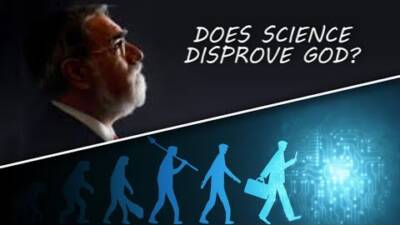The key principles of Judaism, (Creation, Revelation, and Redemption), provide us with three pathways in which to encounter God.
So let’s first take Creation. One of the greatest scientists of our time, Lord Martin Rees, former astronomer, Royal President of the Royal Society, Master of Trinity College, Cambridge, one of the greatest scientists in the world, in his book, Just Six Numbers, points out that the entire existence of the universe depends on six mathematical constants which have to be so precise that the probability of any combustible source of energy coalescing around those six constants is almost infinitesimally small.
The universe is finely-tuned for the emergence of life. It could not have happened by mere chance. Equally, the emergence of life itself from inanimate matter is both inherently mysterious and goes against one of the fundamental principles of entropy, which is that the world is gradually, any system is gradually losing energy and order. Now, biology works in the exactly opposite way, from very simple organisms to ever increasing organisms of self-organising complexity. So, if that didn’t have an intelligent Creator, we would have no way of understanding it at all.
If you look at creation, you realise why it was that Francis Collins, who headed the human genome decoding project began it as an atheist and ended it as a religious believer. If you look at creation, the simplest explanation, and I don’t know of any other for its fine-tuning for the emergence of life, is an intelligent Creator. You don’t need to invoke doubtful concepts like intelligent design. There’s just no other way of explaining how it happened to be like that.
Secondly, in terms of Revelation, the Torah: Look at Judaism. Jews are a tiny people, 14 million perhaps, in the world today. And yet, so powerful were the ideas of Torah that they inspired two other great religions, each of which took a part of Judaism, not the whole of it, but see themselves as worshiping in the God of Abraham. That comprises 2.4 billion Christians and 1.6 billion Muslims, far more than half the people alive today.
Now, how was it that a man, Abraham, who lived almost 4,000 years ago, who commanded no armies, ruled no empire, performed no miracles, uttered no world-changing prophecies, yet his lessons are so and true and eternally valid that they have persuaded more than half the world’s population? There is not a single human being who has ever lived who had a greater influence. If that is not proof, through history, empirically, of the truth of revelation, I don’t know what is.
As for Redemption, the great open societies of the West were built in the 17th century by people deeply immersed in the Hebrew Bible, whether they be John Milton and John Locke in England, or the great Calvinists in Scotland or in Holland, or the Puritans who made their way in the 1620s and 1630s to America. These were all people inspired by Torah to build free societies with the respect for human dignity and rights. That is the clearest form of redemption that we’ve had. Every redemptive movement that has succeeded, (and there have been plenty that failed like the Russian revolution, the French revolution, which were essentially secular movements), every redemptive movement that’s brought freedom to human beings and to human society has been based on the Torah, usually very explicitly.
So whether we look at Creation or Revelation or Redemption, that can be, I think, no doubt that these things are all Divine. They are the three ways that point us to God.
In partnership with TorahCafe (www.torahcafe.com), Rabbi Lord Jonathan Sacks recorded a series of short videos in May 2013, in answer to some of the most frequently asked questions of Judaism (and faith in general).
SHARE
More from FAQs

What was the Rambam controversy?
Question 13

What is Jewish leadership all about?
Question 12

Would the world be better without any religion?
Question 11

What is a Rabbi?
Question 10

Why do bad things happen to good people?
Question 9

What do Jews believe about the afterlife?
Question 8

What's the purpose of life?
Question 7

What does the term ‘Chosen People’ mean?
Question 6

If you could ask God one question, what would you ask?
Question 5

How can the belief in God be reconciled with science, especially evolution?
Question 4

How can the Torah be trusted?
Question 3

What are the basic beliefs in Judaism?
Question One
